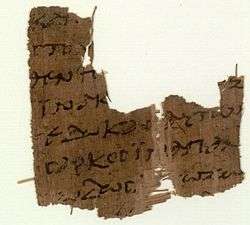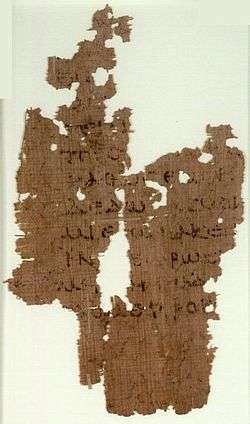John 17
John 17 is the seventeenth chapter of the Gospel of John in the New Testament of the Christian Bible. It portrays a prayer of Jesus Christ addressed to His Father, placed in context immediately before His betrayal and crucifixion, the events which the gospel often refers to as His glorification.[1] Methodist theologian Joseph Benson calls this prayer "Our Lord’s Intercessory Prayer", because "it is considered as a pattern of the intercession he is now making in heaven for his people".[2] The book containing this chapter is anonymous, but early Christian tradition uniformly affirmed that John composed this Gospel.[3]
| John 17 | |
|---|---|
 John 17:1-2 on Papyrus 107, written in 3rd century. | |
| Book | Gospel of John |
| Category | Gospel |
| Christian Bible part | New Testament |
| Order in the Christian part | 4 |
Text

The original text was written in Koine Greek. This chapter is divided into 26 verses.
Textual witnesses
Some early manuscripts containing the text of this chapter are:
- Papyrus 108 (2nd/3rd century; extant verses 23-24)
- Papyrus 66 (~200; complete)
- Papyrus 107 (3rd century; extant verses 1-2,11)
- Codex Vaticanus (325-350)
- Codex Sinaiticus (330-360)
- Codex Bezae (~400)
- Codex Alexandrinus (400-440)
- Codex Ephraemi Rescriptus (~450; complete)
- Papyrus 84 (6th century; extant verses 3, 7-8)
- Papyrus 60 (~700; complete).
- Papyrus 59 (7th century; extant verses 24-26).
Jesus' Prayer
Jesus refers to His Father six times in this chapter, calling God "Father" (Greek: πατηρ, pater), "Holy Father" (Greek: πατηρ ἅγιε, pater hagie, John 17:11) and "Righteous Father" (Greek: πατηρ δικαιε, pater dikaie, John 17:25). These are the only occurrences in the New Testament of the vocative forms αγιε and δικαιε, used in direct address to God.[4]
Verse 1
- Jesus spoke these words, lifted up His eyes to heaven, and said: "Father, the hour has come. Glorify Your Son, that Your Son also may glorify You".[5]
Alternatively, "After Jesus had spoken these words ..." (to his disciples, in chapter 16),[6], namely:
- "These things I have spoken to you, that in Me you may have peace. In the world you will have tribulation; but be of good cheer, I have overcome the world."[7]
Benson suggested that "these words" refers to "the words recorded in the three preceding chapters" (chapters 14 to 16).[2]
Verse 12
- While I was with them in the world, I kept them in Your name. Those whom You gave Me I have kept; and none of them is lost except the son of perdition, that the Scripture might be fulfilled.[8]
Verse 21
- that they all may be one, as You, Father, are in Me, and I in You; that they also may be one in Us, that the world may believe that You sent Me.[9]
See also
- Farewell Discourse
- Jerusalem
- Jesus Christ
- That they all may be one
- Ut unum sint
- Other related Bible parts: John 13, John 14, John 15, John 16
References
- Halley, Henry H. Halley's Bible Handbook: an Abbreviated Bible Commentary. 23rd edition. Zondervan Publishing House. 1962.
- Benson, J., Benson Commentary on John 17, accessed 6 June 2019
- Holman Illustrated Bible Handbook. Holman Bible Publishers, Nashville, Tennessee. 2012.
- Englishman's Concordance, ἅγιε and δίκαιε
- John 17:1 NKJV
- John 17:1 NRSV
- John 16:33 NKJV
- John 17:12
- John 17:21
External links
- John 17 King James Bible - Wikisource
- English Translation with Parallel Latin Vulgate
- Online Bible at GospelHall.org (ESV, KJV, Darby, American Standard Version, Bible in Basic English)
- Multiple bible versions at Bible Gateway (NKJV, NIV, NRSV etc.)
| Preceded by John 16 |
Chapters of the Bible Gospel of John |
Succeeded by John 18 |